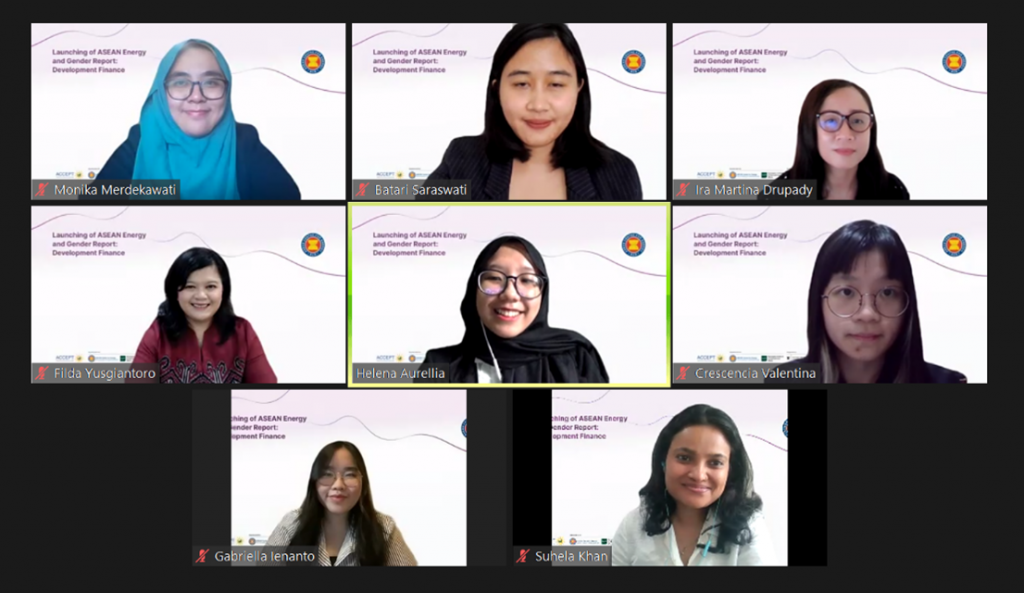Online, 28 March 2022

The launch of ASEAN Energy and Gender Report: Development Finance has successfully been conducted online on 28th March 2022. The event was held in celebration of International Women’s Day to promote the importance of women empowerment in the energy sector. The launch consisted of a key message by Christine Lins, the Executive Director of Global Women’s Network for the Energy Transition (GWNET), followed by a keynote speech by Filda Citra Yusgiantoro, the chairperson of Purnomo Yusgiantoro Center (PYC), and the report presentation by Monika Merdekawati, the Technical Officer of Renewable Energy and Energy Efficiency (REE) at ASEAN Centre for Energy (ACE), as the lead author. The event was concluded by a panel discussion moderated by Gabriella Ienanto.
In her key message, Christine Lins explains that energy transition goes beyond replacing fossil fuel to clean sources, but it also pertains to changing consumption, distribution, and investment patterns. She also explains that although progress is being made globally in regard to women’s participation in the energy sector, the lack of harmonised data sets proves to be a barrier to evaluating its output. She concludes her message by affirming the power of gender equality in the energy sector, which besides providing the enjoyment of women’s human rights, also improves the global GDP and increases the profitability of companies.
In her keynote speech, Filda Citra Yusgiantoro highlighted that women have a big opportunity to grow and enrich the energy transition. Because of a fast-rising demand, gender equality in the energy sector should also be improved. In a world where women’s household struggles in energy procurement are often overlooked, investors and partners should increase the quality and quantity of investments to increase women’s access to affordable and reliable energy. She also explains that workshops and trainings will be able to further assist women towards energy transition. Finally, she expresses the firm belief that the ASEAN Energy and Gender Report will be able to provide beneficial insights to policymakers towards women’s empowerment in the energy sector.
The ASEAN Energy and Gender Report: Development Finance, presented by Monika Merdekawati, explores the interplay between gender equality, energy access, and economic empowerment. She highlighted the presence of gender inequality across all Sustainable Development Goals, particularly economy and energy sector, as described in the ASEAN Gender Outlook. In ASEAN, 67 percent of women work in the informal sector while 3 percent live below the poverty line. She explains the success stories of gender and energy access programmes in regard to job creation, social entrepreneurship, and community based renewable energy. In regard to development finance, she explained that only 3.3 percent of total development finance has been allocated for energy projects. The number is even smaller for gender projects with 2.7 percent of total development finance. Development finance for gender and energy projects has mostly been allocated for coal-fired electric power plants. Meanwhile, only USD 76 million has been invested into energy access with gender element from 2010 to 2019.
She concluded her presentation by recommending leaders to form an integrated ASEAN roadmap to achieve gender equality, implement gender-specific indicators to accurately track gender growth data that can be used in future policy frameworks, and formulate adequate regulatory frameworks to encourage women’s participation in the energy sector. Lastly, she highlighted the role of education where women can learn entrepreneurship and leadership that could improve their welfare and development.
The final agenda of the Energy and Gender Report Launch is the panel discussion moderated by Gabriella Ienanto, Associate Officer of Power, Fossil Fuel, Alternative Energy and Storage (PFS) at ACE. Joining the panel discussion was 3 women panellists; Batari Saraswati, Head of Corporate Planning & Risk Management, PT Surya Semesta Internusa Tbk; Ira Martina Drupady, Research Associate, Energy Studies Institute, National University of Singapore; and Suhela Khan, Country Programme Manager, WeEmpower Asia, UN Women.
Batari Saraswati started the discussion by remarking that there has been a significant improvement in addressing gender equality in the energy sector. However, there are new renewable energy projects with new employment opportunities which are not balanced for men and women due to technical issues and bias. She explained that men could help by having an unbiased gender hiring policy and more gender-responsive actions such as prerequisite gender manuals. She also explained that due to geopolitical aspects, women and children are the most vulnerable in regard to energy access and security.
Similarly, Ira Martina Drupady explained that women play an active role in alleviating energy poverty and are often seen as pioneers in communities. However, despite policies being gender equal, it does not mean that they provide a gender lens to the communities. She highlighted that the opportunities in development finances in ASEAN would be to move away from commercial level indicators as policymakers should look at meaningful and valuable indicators despite not having direct commercial values. She also encourages policymakers to integrate what communities think and want of their energy usage.
Lastly, Suhela Khan explained that gender inequality should be targeted in a conscious manner, not only at the community level but for the economy as a whole. When it comes to energy policies, women should not only be seen as end users. She highlighted the importance of women in leadership as the presence of gender imbalance in the investment team would result in an influence by the majority. She believes that a performance and sustainability green bond with gender guidelines integrated into the bonds would be a potential policy that can be developed.
To achieve the Sustainable Development Goals, gender equality must be addressed separately and utilised as a catalyst to advance economic recovery and the energy transition. Considering the crucial role gender equality plays, there is an urgent need to provide adequate fundings for gender-related energy access programmes, through development finance. The ASEAN Energy and Gender Report: Development Finance is expected to help ASEAN policymakers realise the need of financial support for gender-related energy projects in ASEAN, as well as providing recommendations on the concrete actions.
Together, we can #BreakTheBias.